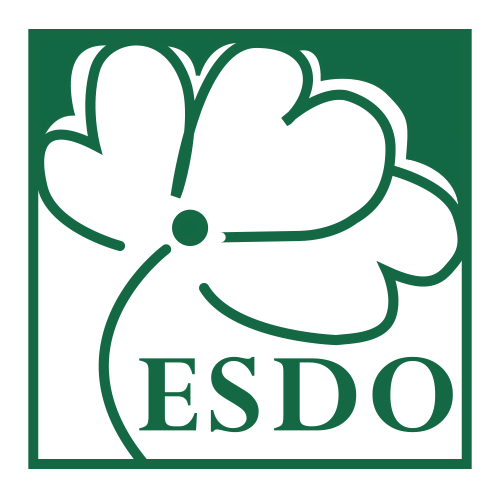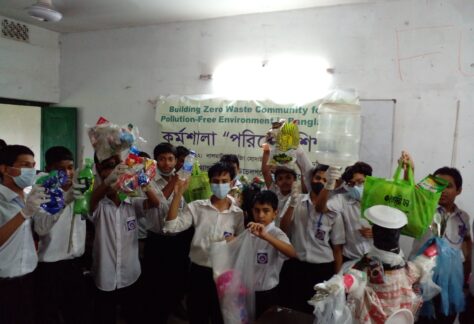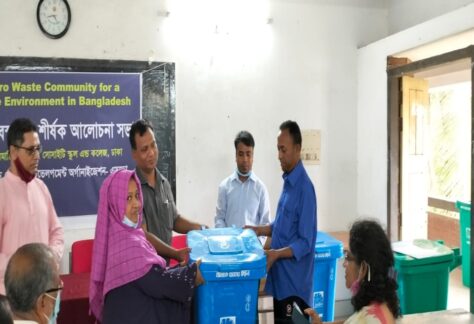Go for Zero-Waste
Zero-Waste Community - ESDO
Background
ESDO plans to create Zero Waste communities through effective management and the use of waste. Zero Waste describes a scenario where production, consumption, reuse, and recovery of products, packaging, and materials are done responsibly, i.e. without burning and with no discharges to land, water, or air that threatens the environment or human health. The current challenges of waste management are the top-down approach and lack of community participation and ownership. All though old and outdated waste collection as well as the management systems also a big challenge of the present waste management. A Zero Waste community would recycle 100% of their waste, or recover and produce no harmful waste for the environment, human health, and other living organisms. An effective program to promote zero-waste communities will present not only clear, tangible solutions to all types of waste but also provide unique data that can drive campaigns and policy decisions. The project can bring attention to Zero Waste practices by highlighting success stories and lessons learned, globally, and be replicated in other low- and middle-income countries. ESDO will refer to other existing programs in Europe, Asia, and around the world as well as depend on its own experience of developing Zero Waste models in Bangladesh for this project. The main interventions and activities in the project are to assess and identify the current waste management scenario and generate a solution model within the estimated timeline, plan and test zero waste mechanism, Establish partnerships and linkage with the communities the local government, and other relevant agencies, Organize infrastructures such as set up – domestic waste composting unit, central composting, rooftop gardening in cities, organic farming, etc. and Capacity Building. Capacity building will include providing training to waste pickers on zero waste mechanisms and practices, small and medium entrepreneurship development, and media workshops. The project aims towards changing existing values – from an expense-based approach to a resource management-based approach by approaching waste as an asset to be managed instead of a liability. A key strategy of the project will be the formation of public-private partnerships (PPP) that will provide oversight, coordination, and management of Zero Waste Communities. The project will create an effective model of zero-waste communities appropriate for lower-middle-income countries like Bangladesh. More specifically, the project objectives will include:
- Building capacity and supportive policies for implementation and expansion of Zero Waste communities/villages and cities in selected areas of Bangladesh.
- Creating awareness about how Zero Waste practices can improve community health and the environment.
- Encouraging and supporting Zero Waste businesses by improving the understanding of the supply chain and recycling.
- Identifying and establishing alternatives for single-use plastic products.
- Develop evidence-based models, performance indicators, and outcome data to create the basis for
- Zero Waste programs with scalable financing/investment mechanisms in order to accelerate their replication.
The project will gather, synthesize, and disseminate evidence and data about Zero Waste programs and their impact. It will also allow ESDO to proactively promote a specific alternative or a better way forward for waste management. It will help to identify ways to change the system of packaging (promote standardized packaging and labeling), application of eco-designs, and policies related to waste management. The project will help to test a long-term funding model, laying a foundation for how zero waste projects can go to scale without ongoing donor support, and for governments and other financiers of waste management (e.g. private investment, crowd funders, impact investors) to get informed.
Major Activities
Launching the pilot project in July 2020, ESDO has already made some notable actions in this project. Some mentionable works of ESDO in this journey are mentioned here-
- ESDO assessed the current situation of waste management through a baseline survey and prepared survey report.
- Several field testing has been done in selected households through the 4R approach to show segregated waste collection procedures and identify challenges.
- ESDO has conducted many awareness-building actions through distributing awareness materials, developing the zero-waste website, creating Facebook posts, SMS campaigns, and environmental education.
- ESDO has also led three community consultations, two CBO formations, and a media orientation in Rangpur and Dhaka to educate them on proper waste management.
- Some videos have been made to demonstrate the home composting processes.
- 145 backyard twin-pits have been set up in the back yard of houses in Betgari for composting units.
- 450 people registered to adopt zero waste lifestyle from 3 different locations.
- 60 jobs were created for waste collectors.
- 1 Organic Farming Plot in Betgari, Rangpur.
- 2 Rooftop gardens with organic fertilizer.
- Environmental education camp to adopt Zero Waste Lifestyle.
- Set up 2 Biogas plants in the rural communities.
- Successfully made compost from earth composter.
- Ensuring Food Security in the Future: Toxic-free Organic Farming at Betgari Union in Rangpur District, Bangladesh.
- The plot featured a variety of crops including potatoes, spinach, brinjal, cauliflower, green chilies, carrots, onions, and garlic. The predominant crop in the area was Desi 29 Paddy, accompanied by brinjal, green chilies, and pumpkin greens. The first week of June marks the anticipated harvest of Desi 29 Paddy.
- Members of ESDO’s Zero Waste Community in Betgari are selling Compost. Due to the high quality and increasing demand for their compost, they have recently begun selling it, marking their first venture into the market with a price set at 35 kg.


